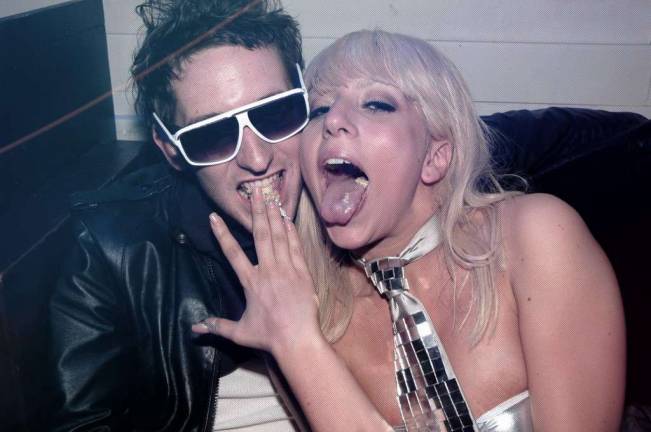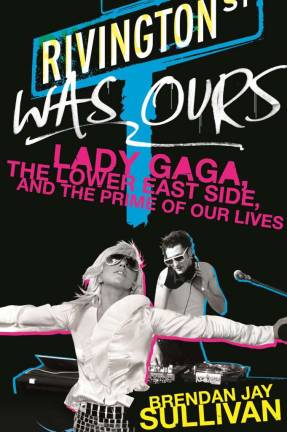When Lady Gaga Was Still Just Stefani


In his new book, author Brendan Jay Sullivan remembers the history of the Lower East Side
The "One day, when I'm famous" daydream is shared throughout New York City; by struggling musicians and bullied children; by underpaid barbacks and underappreciated college students alike. The counterpoint daydream: "One day, when someone I know is famous" probably gets considerably less airtime. Yet statistically speaking, it's a much more likely future outcome.
It's also exactly what happened to Brendan Jay Sullivan, 31-year-old author of "Rivington Was Ours: Lady Gaga, The Lower East Side, and the Prime of Our Lives." In the book, Sullivan shares the story of his life working the Lower East Side night scene as DJ VH1, and the friendship he fostered with Lady Gaga. As Gaga ? a struggling NYU dropout-cum-performance artist ? attempts to blaze a trail that will lead her from go-go dancing in seedy dive bars to tangible prestige, Sullivan attempts to grow up and out of his first New York heartbreak.
Gaga succeeds in that mission (spoiler!), and in the story's retelling, Sullivan succeeds in his: capturing the raw ups and downs of being 25, creative, and ambitious in New York. And although the narration is at turns self-congratulatory and/or trite, it's also unflinchingly honest and self-aware. And that honesty, like a bubblegum pop Billboard Hit of the summer, ultimately wins the reader over.
We caught up with Sullivan to discuss the book.
This book is all about working on the Lower East Side. How do you feel like the neighborhood has changed since the book's 2006-2008 setting?
The thing about New York is everything you love about it changes, and you just have to learn to love that too. Wherever you live, when you walk down the street, you're the expert on your street. You know when a restaurant goes in, or when a neighbor builds a deck. In New York, you just don't watch things disappear - you watch them turn into something else. and the same with the people in your life. The great thing about New York is you have the city to remind us that things will change, but it's an opportunity to take a look back.
For every Lady Gaga, there are 10,000 New York artists who are struggling. How much of her fame do you attribute to talent, how much to business savvy, and how much to luck?
What we call luck is a result of thousands of hours behind Gaga that we never saw. She worked and worked and worked. And people who work like to work with people who work.
The New York art scene is, in large part, about status. A few years ago, you raised a fair share of money online to help a homeless woman name Jackie. Talk a little about that relationship, and what it means to you.
Well, I was on my way to a job interview, and this homeless woman asked me for money, and I had to tell her I didn't have any. And she said "You'd better not, because I ask you every day." And I said, "I'm on my way to a job interview right now, but if I get the job, I'll take you out for Chinese food on my first paycheck." I didn't have anybody rooting for me then, this was before Gaga? and then I got to share my life with somebody. Because I no longer thought "I want to get out of this job," I'd think "maybe if I earn a little more money, I can take Jackie out".
And for a while I made tons of money, but I lost all of that in one very long winter. And some of my old friends, they didn't really care to hang out with me, now that I had no money, status, or connections. But Jackie did, and that's why Jackie's my real friend.
Jackie had an opportunity to move into a place. She went from subway to halfway house to YWCA? and then through Common Ground, she got a place. She moves in, but she's far from her friends, and she has no sheets, and she would sleep on the floor.
So I started the drive, to help her set up her apartment. I wanted to make a video to show people how important Jackie was to me, but I was also afraid to admit that I had lost my job during that time. I was afraid to admit that ConEdison was coming to shut off my power. During that time, I had to tell her that day I couldn't give her any money. But instead of abandoning me like everyone else did, she came over with a big bag of groceries, and took care of me until I found a new job.
Most people don't have homeless or formerly homeless friends, and most people don't have mega-famous friends either. Talk about the difference between the two, and what these two people have brought out of you.
Jackie doesn't care that I'm a big famous DJ. She cares that I'm her friend, and that I'm doing okay. And that I'm not going to leave.
When was the last time you worked with Lady Gaga?
Right at the end of 2008.
How often do you two speak today?
I see her when you see her. It goes back to what I was saying before, how things in New York, things don't disappear, they just turn into something else. I celebrate our relationship the way I celebrate everything else in New York.
Where can New Yorkers find your book?
There are signed copies at Housing Works Books [126 Crosby Street] that we've donated to fight the twin problems of AIDS and homelessness in our city, and there are other signed copies at the Tenement Museum [91 Orchard Street]. It was also chosen as a "Best New Non-Fiction" book by Barnes and Noble, and can be purchased at their stores.
Now that Lady Gaga is famous and those days are over, how do you look back on her?
I don't think about working for her, I think about how I was going through a rough breakup, and there were only two people who called to check on me. One was Jackie, and the other was Gaga.